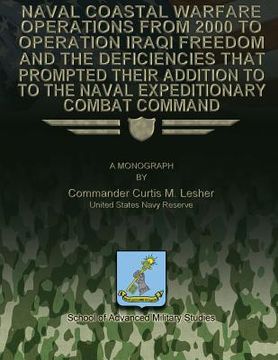Share
Naval Coastal Warfare Operations From 2000 to Operation Iraqi Freedom and the Deficiencies That Prompted Their Addition to the Naval Expeditionary Com
Us Navy Reserve Commander Curti Lesher
(Author)
·
School Of Advanced Military Studies
(Contributions by)
·
Createspace Independent Publishing Platform
· Paperback
Naval Coastal Warfare Operations From 2000 to Operation Iraqi Freedom and the Deficiencies That Prompted Their Addition to the Naval Expeditionary Com - Studies, School Of Advanced Military ; Lesher, Us Navy Reserve Commander Curti
Choose the list to add your product or create one New List
✓ Product added successfully to the Wishlist.
Go to My Wishlists
Origin: U.S.A.
(Import costs included in the price)
It will be shipped from our warehouse between
Friday, July 26 and
Friday, August 02.
You will receive it anywhere in United Kingdom between 1 and 3 business days after shipment.
Synopsis "Naval Coastal Warfare Operations From 2000 to Operation Iraqi Freedom and the Deficiencies That Prompted Their Addition to the Naval Expeditionary Com"
Over the last decade the importance of Naval Coastal Warfare (NCW) to the United States Navy as a viable asset in the war on terror and conflicts in the Middle East is on the rise. Because the Navy's focus during the decades between the Vietnam War and the attack on the USS Cole was primarily on the former Soviet threat, shallow water forces were considered low priority. As a result NCW became a low priority force manned primarily by reservists. From the year 2000 through Operation Iraqi Freedom (OIF), NCW has operated with deficiencies in manpower, weapons, ammunition, vehicles, communications and training. NCW units have participated in many overseas exercises prior to OIF. During these exercises the threat of rear area attacks from terrorist groups became a major concern for all U.S. forces. In assessing the threat NCW found that not only was the threat to U.S. ships in the ports they were protecting more at risk, but that their own lodging sites and personnel in transit to duty stations were very vulnerable to attack. By the time OIF was underway NCW had not addressed most of the deficiencies they had seen during previous exercises and now they would be asked to perform missions that had never been attempted by NCW units before. Force protection missions at Kuwaiti and Iraqi ports along with a vital mission at the Iraqi oil platforms would need to succeed regardless of the problems encountered by the NCW units. The reader will see that there are four main deficiencies that NCW needs to solve. 1) Manning that is inadequate, untrained and unsuited to rapid deployment because it is mainly a reserve force. 2) Inadequate amounts and types of equipment. 3) Communications systems that do not allow communications between all units in theater. 4) NCW units are low priority when it comes to funding. Very little unclassified historical information or lessons learned is available, so a brief historical account of Naval Coastal Warfare Group One units during a few routine exercises and OIF will demonstrate their deficiencies as well as provide a historical record that is long overdue. The reader will also see the transition of NCW as it changes from a small configuration in early 2000 to a larger more viable configuration in the Maritime Expeditionary Security Force which is a component of Naval Expeditionary Combat Command (NECC). With the creation of the NECC and the inclusion of NCW forces under its umbrella, many of the deficiencies have potentially been eliminated. Since very little published historical information on NCW exists, portions of the information contained within this monograph are taken from recent interviews, transcripts of interviews with NCW personnel conducted during the summer of 2003, my own experiences and my personal journal entries recorded during actual operations. Published sources of information include articles from professional journals, periodicals, monographs and analysis papers.

